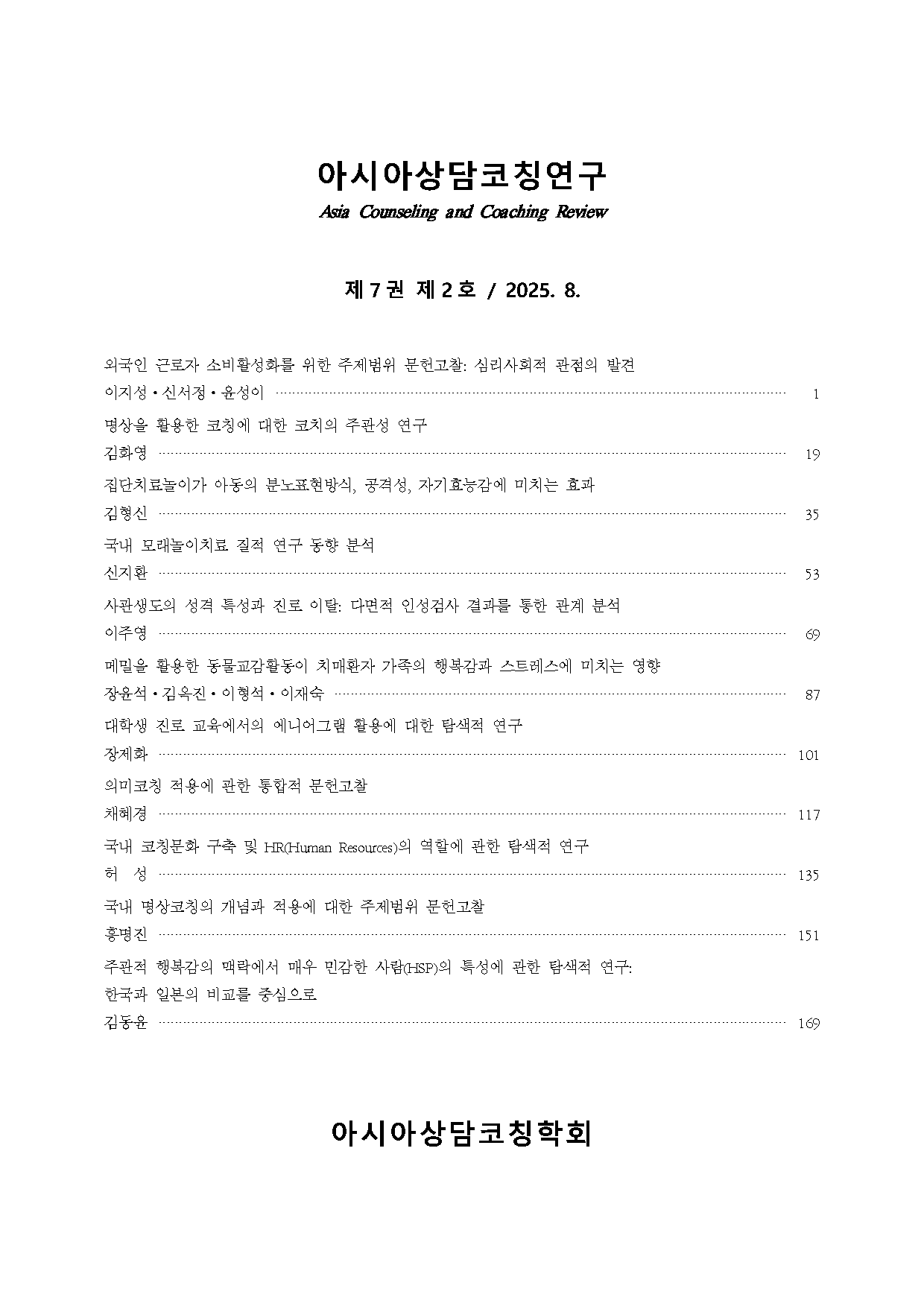사관생도의 성격 특성과 진로 이탈: 다면적 인성검사 결과를 통한 관계 분석
Personality Traits and Career Disengagement in Military Cadets: An Analysis of Relationships Based on MMPI-2 Results
- 아시아상담코칭학회
- Asia Counseling and Coaching Review
- 제7권 제2호
-
2025.0869 - 86 (18 pages)
-
DOI : 10.47018/accr.2025.7.2.69
- 21

본 연구는 사관생도(이하 생도)의 진로 이탈을 방지하고 진로 적응을 돕기 위해 개인의 성격 특성과 진로 이탈 간의 관계를 실증적으로 분석하였다. 연구 대상은 K 사관학교에 2022~2025년 입학한 생도 중 다면적 인성검사(MMPI-2)에서 이상 반응을 보여 진로 이탈 위험이 높다고 평가된 120명이다. 이들의 MMPI-2 검사 결과를 바탕으로 진로 이탈 여부에 영향을 미치는 위험 요인 및 보호 요인을 파악하고, 정서적 특성에 따른 하위 군집을 분류하였다. 연구 결과 첫째, MMPI-2 척도 중 일부가 진로 이탈 여부와 유의미한 관계를 보였다. RC8(기태적 경험), MDS(결혼생활 부적응), GF(여성적 성역할) 척도는 진로 이탈의 위험 요인으로, PSYC(정신증), OH(적대감 과잉통제) 척도는 보호 요인으로 작용하였다. 둘째, 정서적 취약성의 하위 유형은 4가지 정서적 유형(심각하게 불안정한 감정반응군, 적극적으로 회복하는 안정형군, 조용히 억제된 감정보존군, 자율적으로 고립된 내향형군)으로 확인되었으며, 이들 군집은 정서 조절력, 자기통제력, 사회적 반응 양상에 따라 차별적으로 구분되었다. 다만 군집 간 진로 이탈률에서는 유의미한 차이가 나타나지 않았다. 본 연구 결과는 진로 이탈에 영향을 미치는 심리적 요인을 확인하고, 사관학교 선발 단계 또는 입교 초기 진로 이탈 위험군을 조기에 식별하는데 활용할 수 있는 기초자료를 제공한다. 또한 이상 반응자 집단 내 진로 이탈의 가능성이 높은 하위 군집을 조기에 파악하고, 맞춤형 상담 및 코칭 전략 수립의 효과적인 토대가 될 것으로 기대한다.
This study examined the relationship between personality traits and career disengagement among cadets to prevent attrition and support career adaptation. A total of 120 high-risk cadets from the Korea Military Academy (KMA), admitted between 2022 and 2025 and identified through abnormal MMPI-2 responses, participated in the study. Based on MMPI-2 results, key risk and protective factors were identified. RC8 (Aberrant Experiences), MDS (Marital Distress), and GF (Feminine Gender Role) scales were associated with higher attrition risk, while PSYC (Psychoticism) and OH (Overcontrolled Hostility) scales served as protective factors. Additionally, four emotional subtypes were classified: severely unstable responders, resilient stabilizers, quietly suppressed affect maintainers, and autonomously isolated introverts. These subgroups differed in emotional regulation, self-control, and social response styles. However, the attrition rate did not significantly differ among clusters. These findings contribute to understanding psychological factors that influence cadet disengagement and offer practical value for identifying at-risk individuals early in the selection or training process. Furthermore, emotional subgroup classification within the abnormal respondent group provides a foundation for individualized counseling and coaching strategies to support career continuity in military training environments.
Ⅰ. 서론
Ⅱ. 연구 방법
Ⅲ. 연구 결과
Ⅳ. 논의 및 결론
참고문헌
(0)
(0)